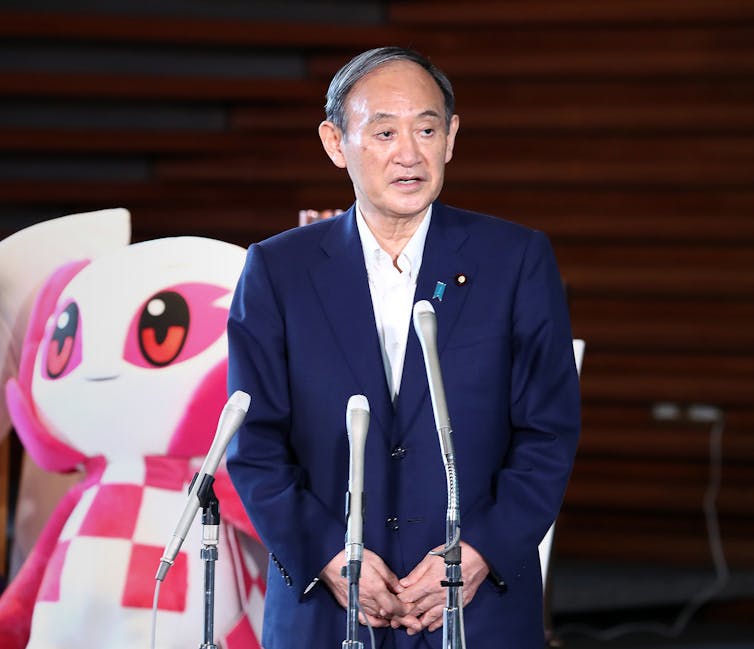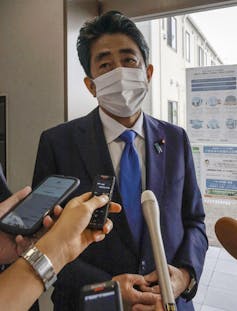Who will replace Yoshihide Suga as Japan's prime minister? Here's a rundown of the candidates
- Written by Craig Mark, Professor, Faculty of International Studies, Kyoritsu Women's University
The sudden decision by Prime Minister Yoshihide Suga to step aside as leader of Japan’s ruling conservative Liberal Democratic Party (LDP) has dramatically shaken up this month’s leadership race — and likely the national election, due soon after.
Suga’s poor handling of the COVID-19 pandemic since succeeding Shinzo Abe[1] last year led to a steady decline in his approval ratings, and the subsequent loss of backing[2] from leaders in his party.
Instead of a post-Olympic bump, Suga’s cabinet saw its lowest approval ratings[3] since he took office at just 29% in mid-August. The Japan Times blamed[4] this on Suga’s government, specifically:
the public’s relentless frustrations over the country’s protracted vaccine rollout and empty promises on containing the pandemic.
A slew of candidates are now jockeying to replace Suga as prime minister at the LDP leadership election on September 29 and then carry the party into the general election, due by the end of November.
With a weakened opposition, the LDP would still be favoured to retain power in the Diet (Japan’s parliament) after the general election, meaning whoever wins the party leadership contest will likely remain the country’s prime minister.
 The unpopular Yoshihide Suga has been in office for less than a year.
Jiji Press/EPA
The unpopular Yoshihide Suga has been in office for less than a year.
Jiji Press/EPA
Powerful factions could be key
There are two openly declared candidates already running: Fumio Kishida, a former foreign minister who finished second to Suga in last year’s leadership ballot; and Sanae Takaichi, a former internal affairs and communications minister who would become the first female prime minister, if successful.
Taro Kono, the minister leading Japan’s COVID vaccination drive, is now emerging[5] as another challenger. Kono is already topping opinion polls[6] as the preferred leader among the public, with former Defence Minister Shigeru Ishiba second and Kishida running third.
Read more: Japan: why PM Suga unexpectedly stepped down – and what happens next[7]
Whoever wins will come down to the seven main factions within the LDP — the competing yet ideologically aligned caucuses in the party, which have traditionally been the patronage networks of senior powerbrokers.
The factions have a sizeable influence over who gains pre-selection as candidates, who serves on Diet committees and in senior positions in the party organisation and the cabinet, and ultimately, who leads the LDP.
Wrangling support from the LDP’s factions, as well as the 59 unaligned party members in the Diet, will now consume the aspiring candidates, with feverish politicking already under way.
Fumio Kishida
Kishida is a relative moderate, who leads his own LDP faction of 46 members.
For his main leadership policy pitch[8], he has proposed large increases in government support to businesses and irregular workers affected by the pandemic, and other measures such as digital vaccine passports.
Kishida was Japan’s longest-serving foreign minister during former Prime Minister Shinzo Abe’s return to government from 2012–17, and so is highly experienced on the international stage. He played a large role in negotiating[9] the Trans-Pacific Partnership treaty.
However, as head of the LDP’s Hiroshima branch, he was tainted[10] by its association with a recent vote-buying scandal, in which a husband-and-wife political team based in Hiroshima was convicted for bribing local politicians to ensure their pre-selection.
Sanae Takaichi
Takaichi is unaligned to any faction and was previously considered an outlier. However, she upset the race at the weekend by receiving the vital endorsement of Abe[11], who is still in the Diet and wields considerable influence as Japan’s longest-serving prime minister.
Like Abe, Takaichi is a staunch conservative[12]. She is a member of the ultranationalist Nippon Kaigi[13] organisation, which aims to restore the emperor to divine status, keep women at home, prioritise public order over civil liberties, and rebuild Japan’s armed forces. She is also an enthusiastic supporter of the controversial Yasukuni shrine, where war criminals are deified.
Takaichi also favours punishing media outlets[14] that are critical of the government, and prison terms for damaging the Japanese flag[15]. In 2014, she hosted office visits for far-right extremists[16], and in the 1990s even endorsed a book[17] that praised Adolf Hitler’s political strategy.
If Abe convinces his Hosoda faction — the largest in the LDP with 96 members — to back Takaichi, this will give her a great advantage.
Taro Kono
Kono is backed by the departing Suga[18] and the faction of Deputy Prime Minister Taro Aso, the second-largest in the LDP with 53 members.
The former foreign minister and defence minister is also popular with the public, due to his energetic social media presence and fluency in English[19].
The highly ambitious Kono has managed to maintain this popularity despite the challenges he has faced[20] leading Japan’s sluggish vaccine rollout.
He has largely avoided public criticism by acknowledging and apologising for the initial delays, and recently overseeing an increase in the pace of vaccinations[21] to more than a million a day.
Read more: Japan is facing a fourth COVID wave and sluggish vaccine rollout. Will it be ready for the Olympics?[22]
Shigeru Ishiba
Ishiba heads a faction of 20 members and is relatively popular among the LDP rank-and-file.
He placed third in last year’s leadership vote to succeed the departing Abe and said last week he is still willing to serve as prime minister[23].
The genial Ishiba is generally favoured among the public (although less so now than Kono), but he will struggle to gain much support among Diet members outside his own faction.
Weakened opposition won’t put up much fight
Opposition leader Yukio Edano quickly pounced[24] on Suga’s decision to stand aside, calling it an “irresponsible” move as Japan continues to battle a fourth wave of COVID infections.
But Edano has been a lacklustre leader, and his party, the centrist Constitutional Democratic Party (CDP), currently holds just 113 seats in the lower house of the Diet. The CDP has announced it will only run the bare minimum[25] of 233 candidates required to win a majority, which means it would need the support of smaller parties — including the Japanese Communist Party — to form a minority government.
 Will former PM Shinzo Abe play an outsized role in the coming leadership fight?
Kyodo News/AP
Will former PM Shinzo Abe play an outsized role in the coming leadership fight?
Kyodo News/AP
The LDP, by comparison, currently has 276 seats[26] while its junior coalition partner, Komeito, holds another 29. By replacing the unpopular Suga, the LDP hopes it can limit the expected loss of seats to no more than 40, which would still allow it to govern with a clear majority.
Whoever wins the prime ministership, the next Japanese government will likely continue the LDP’s policies of debt-funded monetary and fiscal expansion[27], including record military spending[28] and unwavering support for the US alliance and the “Quad” security grouping comprising the United States, Japan, India and Australia.
Read more: Japan signals a 'sense of crisis' over Taiwan — this is why it is worried about China's military aims[29]
The next leader will also need to balance these commitments with Japan’s increasingly strained diplomatic relations with China[30].
Tokyo angered Beijing in recent months by referring to the importance of Taiwan[31] to regional security in a defence white paper, meaning China will be closely watching how the next prime minister publicly discusses the Taiwan issue[32].
However, the greatest immediate challenge for Japan’s next leader will be completing the vaccine rollout and overseeing the economic recovery from the pandemic. The country’s beleaguered COVID response likely cost Suga his job[33], so whoever replaces him faces a tough task to regain the public’s trust and restore faith in the government’s ability to protect their health, security and prosperity.
References
- ^ succeeding Shinzo Abe (theconversation.com)
- ^ loss of backing (theconversation.com)
- ^ lowest approval ratings (www3.nhk.or.jp)
- ^ blamed (www.japantimes.co.jp)
- ^ now emerging (www.japantimes.co.jp)
- ^ topping opinion polls (english.kyodonews.net)
- ^ Japan: why PM Suga unexpectedly stepped down – and what happens next (theconversation.com)
- ^ leadership policy pitch (mainichi.jp)
- ^ negotiating (www.mofa.go.jp)
- ^ tainted (www.asahi.com)
- ^ vital endorsement of Abe (www.straitstimes.com)
- ^ staunch conservative (english.kyodonews.net)
- ^ Nippon Kaigi (www.abc.net.au)
- ^ punishing media outlets (www.reuters.com)
- ^ prison terms for damaging the Japanese flag (mainichi.jp)
- ^ far-right extremists (thediplomat.com)
- ^ endorsed a book (www.thetimes.co.uk)
- ^ backed by the departing Suga (www.theguardian.com)
- ^ fluency in English (www.japantimes.co.jp)
- ^ challenges he has faced (www3.nhk.or.jp)
- ^ increase in the pace of vaccinations (apnews.com)
- ^ Japan is facing a fourth COVID wave and sluggish vaccine rollout. Will it be ready for the Olympics? (theconversation.com)
- ^ willing to serve as prime minister (www.reuters.com)
- ^ quickly pounced (www.japantimes.co.jp)
- ^ bare minimum (www.asahi.com)
- ^ currently has 276 seats (www.shugiin.go.jp)
- ^ debt-funded monetary and fiscal expansion (www.boj.or.jp)
- ^ record military spending (www.stripes.com)
- ^ Japan signals a 'sense of crisis' over Taiwan — this is why it is worried about China's military aims (theconversation.com)
- ^ diplomatic relations with China (www.foreignaffairs.com)
- ^ referring to the importance of Taiwan (theconversation.com)
- ^ publicly discusses the Taiwan issue (english.kyodonews.net)
- ^ likely cost Suga his job (www.theaustralian.com.au)

















